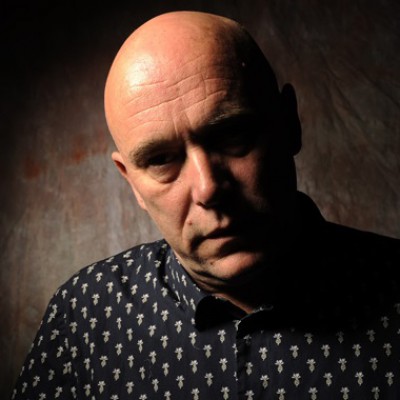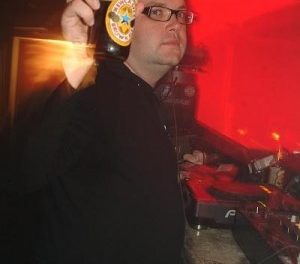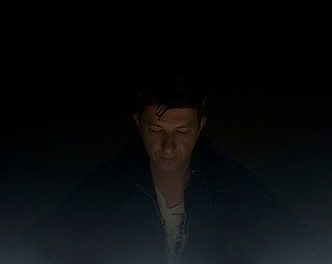The first new feature to be added to the site in a while, the premise of The Joy Circuit is to have artists, label folks, writers and other people within Our Thing talk about a figure or musician they’re a fan of. We’ll have them discuss the impact their work has had on them, and select a short playlist of their favourite songs. Simple enough, right? First up, a friend of the site and an artist and musician in his own rite talks about a studio legend…
Few people can claim to have had as much influence across as many genres of music as Adrian Sherwood. The legendary producer, engineer and label head has worked with and remixed countless artists from within and without the industrial, dub and electronic landscape. Beyond his extensive work with such artists as Ministry and Nine Inch Nails (and his deep remix catalogue, including work with Depeche Mode, Einstürzende Neubauten and Nitzer Ebb amongst countless others) and his genre-busting output as Tackhead, Sherwood’s records has been releasing exciting and experimental records by dub and reggae artists for more than 30 years. With the announcement that On-U will be releasing a second volume of their Sherwood at the Controls compilation covering his work from 1985 to 1990, we thought it would be a good time to sit down with James Andrew Ford of DKA Records, aka recording artist Tifaret, to discuss Sherwood’s enduring appeal, and unique place in the grand pantheon of studio gods.
ID:UD: Sherwood is a really fascinating figure in industrial, in that he worked with so many acts in an engineering and mixing capacity, and those are areas that are often times really transparent to fans and listeners who don’t read liner notes to suss out who worked on something. Is there something specific you hear when you listen to a song with Sherwood involvement that sticks out to you?
James: You can almost always tell a Sherwood production by the groove. No matter what genre it’s rooted in, whether dub or post-punk or industrial, there’s a sense of urgency and fun coexisting with a righteous sense of dread. Sherwood’s an interesting case in that he wasn’t really a musician but more of an Eno figure, someone who used the studio as an instrument in the same sense as Eno, or Sherwood’s dub inspirations like Lee ‘Scratch’ Perry, but he seemed to go further than most in that not only was he interested in experimentation, he seemed to get the best performances out of the musicians by virtue of his sheer enthusiasm for the experimental. I think it’s a crime he isn’t the household name that Eno is.
ID:UD: Another interesting aspect of Sherwood’s work is that it points back to a time when electronic music, dub and hip-hop were far less siloed than they are today. Do you think audiences accustomed to a more strict rules on genre are resistant to hearing those sounds? Do you personally have an interest in exploring those elements in your work?
James: I definitely think there’s a resistance there now that doesn’t seem to have existed at the time Sherwood was involved in the industrial scene. I’m too young to have experienced it firsthand so it’s hard to say that for sure, but when you look at all the classic bands, whether you’re looking at Bauhaus or Skinny Puppy or Throbbing Gristle, there’s an openness to music that I don’t see now, and very specifically an openness to music that would be considered ‘black music’ to most modern goth/industrial fans. A large part of that was the culture these musicians came up in, Bowie had exposed them to funk and soul, there wasn’t much going on in rock music, and these were young kids who had been attracted to Bowie’s flamboyance and weren’t likely to get on the ‘disco sucks’ bandwagon, so they were more open to advances in disco, funk, dub, and the emerging hip hop scene because they were more welcomed there. You could go and hang out at the local disco or dub parties and feel safe being a weirdo because everyone else there was ostracized too for one reason or another. Now you can just go to the local goth night and hear the same music that you’ve heard at every other goth night for the past 30 years, but at the time you had to explore so you got things like the backing musicians from the Sugar Hill Gang working on a Ministry record. Tifaret and DKA both are definitely founded on the idea of being all-inclusive. Coming from Atlanta instead of a huge goth haven like LA means our goth nights have to be friendlier and more inviting to a more diverse crowd of people and over time I think that’s what led to us embracing a more wide-open approach to what we release. When I listen to a demo I’m looking for something that will fill the dance floor at one of our nights which tend to run through classic deathrock to DAF to Sherwood to italo disco to coldwave to recent industrial techno and back, and the only constant is melody and groove. I also tend to be more excited by hearing weirdness like free jazz saxophone, heavy funky basslines, and dub mixing over yet another Skinny Puppy worship act. There’s nothing wrong with that, but we’re post-punk guys and we’re looking for things that explore the wider confines.
ID:UD: One of the definitive aspects of your work with DKA has been a focus on the funky, rhythmic side of industrial and EBM. As a fan of Adrian Sherwood, do you find his influence lead you towards that sound and aesthetic for the label?
James: When we first started DKA I was basically listening to Ministry’s Twitchb non-stop and I basically kept that up for probably the first 2 years we were a label. It’s definitely a huge part of the backbone of DKA. We’re about the dancefloor first and foremost and I think that came out of things like my Sherwood obsession (and my equally important Prince obsession).
ID:UD: Is there anything in Sherwood’s work that you consciously think about when you’re writing and producing? Do you find anything from his work either consciously or unconsciously appearing in songs by Tifaret?
James: The main thing I think of in regards to Sherwood and Tifaret is the drums, the space, and less frequently, the odd almost-glitchy samples running around in songs like “We Believe”. I’m finishing up a split with fellow DKA artist TWINS right now and I recently made a chart of my influences for the record and was surprised how often I referenced Sherwood productions. The heavy in your face kicks and snares of Sherwood’s industrial works are a constant, as are the strange samples of something like his “Yu-Gung” remix. Also the longer I work the more interested in space in mixing I become and Sherwood is a master at that. No matter how dense his music is it always feels like you’re standing in a large room with all these noises coming from around you rather than from a machine.
ID:UD: Do you have a favourite album or single by Sherwood? What about it resonates with you as a fan?
James: Tough call because no matter what else I’m currently vibing to, there’s a Sherwood production I can throw on that will perfectly encapsulate my mood. Album wise it’s hard not to go back to Twitch, although Mark Stewart’s Learning To Cope With Cowardice and Lee ‘Scratch’ Perry’s collaboration with Dub Syndicate Time Boom X De Devil Dead are both perfect as well. Single wise it does’t get any better than Medium Medium’s “Hungry So Angry” which just puts a smile on my face no matter what I’m doing. His productions have a way of making you feel invincible, no matter how angry the lyrics and vocals are you just have to dance or sing along at the top of your lungs, and I think that’s something industrial needs, a shot of hope and positivity.
James Andrew Ford’s Adrian Sherwood Playlist:
Ministry, “We Believe”
Although I’d been familiar with some of his other production work, (such as a few tracks on NIN’s “Pretty Hate Machine”) “Twitch” was probably the first time I really had my head turned by Sherwood. You can still listen to it now and see how ahead of it’s time it was, alternately funky and spare and heavy and dense. Everything you need to know about Sherwood is in these grooves.
Medium Medium, “Hungry, So Angry”
One of the most infectious post-punk dancefloor bangers ever made. Medium Medium are supposedly the first white ‘rock’ group to ever use slap bass and they make Sly proud. I Die: You Die made a mention recently about the funk influence running through all of DKA’s releases and that was dead-on as we’re always looking for ways to bring that fun and funky vibe of early post-punk and industrial back into the goth/industrial/‘whatever’ scene.
Lee “Scratch” Perry and the Dub Syndicate, “Train To Doomsville”
Ever have someone tell you all reggae/dub sounds the same? Yeah, no way. Reggae and dub had a long history of sharing influence (Bob Marley name-checking The Clash, the Sex Pistols listening to dub on their bus in between chaotic shows) but Sherwood took it to a new level, bringing heavy guitar, creepy voices laughing straight out of a Skinny Puppy record, and a grinding industrial intro to the dubfather as Perry rants about…well whatever Perry goes on about.
Mark Stewart & The Maffia, “Jerusalem”
Probably the most straight up dub track on the playlist, this one’s for that late night feel when you’re driving home from the Youth Code show and your ears are still ringing. Mark Stewart will be familiar to most folks as the singer for The Pop Group (themselves a pretty righteous and important influence) but if you can vibe with this you’ve got a whole world of dub out there to explore. Get to it.
Nissenenmondai, “3”
The most recent track on the list, coming out just recently, homie definitely still has what it takes to make the weirdos dance. Ever wanted to hear just the crazy dub parts of “Bela Lugosi’s Dead” stretched into a dub techno track? No? Well Sherwood and Nissenenmondai have you covered anyway.
On-U Sound will release Sherwood At The Controls: Volume 2 1985-1990 on June 17th.
James Andrew Ford records as Tifaret, follow him on Bandcamp and Facebook.
DKA Records has upcoming releases by Boy Harsher, Multiple Man, and a split EP by Tifaret and TWINS. Follow them on Facebook and Bandcamp.







I used to think that Land of Rape and Honey was the pinnacle of Ministry proper, before Al melted into a cartoon character. However, I think Twitch might be the better record. It seems to be the most creatively free of the Ministry records. And stands up against most of the side work pretty well. Sherwood figures into KMFDM’s longstanding dub obsession as well, he did this great remix of Don’t Blow Your Top: http://youtu.be/zXPAf_mRYuQ